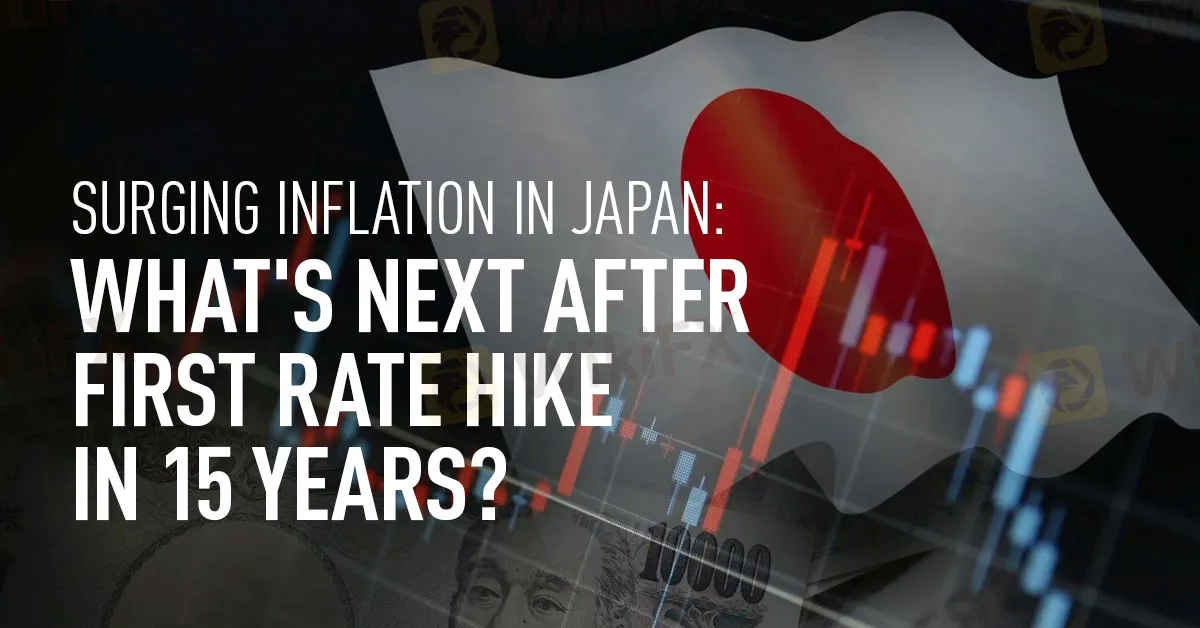简体中文
繁體中文
English
Pусский
日本語
ภาษาไทย
Tiếng Việt
Bahasa Indonesia
Español
हिन्दी
Filippiiniläinen
Français
Deutsch
Português
Türkçe
한국어
العربية
Surging Inflation in Japan: What's Next After First Rate Hike in 15 Years?
Abstract:Consumer inflation in Japan accelerated to its fastest pace in four months, prompting market attention to whether the Bank of Japan might pursue additional interest rate hikes following its first hike since 2007.

Consumer inflation in Japan accelerated to its fastest pace in four months, prompting market attention to whether the Bank of Japan might pursue additional interest rate hikes following its first hike since 2007.
According to the Ministry of Internal Affairs, consumer prices excluding fresh food increased by 2.8% in February compared to a year ago, up from 2% in January, aligning with analysts' forecasts. Similar to previous data for the Tokyo area, much of this growth was attributed to base effects after utility subsidies weighed on prices in 2023.

Following the BOJ's decision to end the negative interest rate, Governor Kazuo Ueda highlighted his close monitoring of service prices, indicating their significance for underlying inflation trends. This observation suggests that changes in service prices, typically occurring at the start of the fiscal year, will be crucial in assessing April's price index.
Ueda explained that the decision to end the negative interest rate was made due to concerns that delaying the move might significantly boost inflationary pressures, potentially necessitating a rapid succession of rate increases. However, he reassured that financial conditions would remain accommodative for the time being, although he acknowledged the possibility of further hikes if inflation risks intensified.
Despite Ueda's remarks, the yen weakened, and Japanese government bond yields fell. Nevertheless, he emphasized the BOJ's readiness to act if upward price risks grew stronger.
Inflation in Japan has proven to be more persistent than initially anticipated, leading the central bank to periodically revise its price growth projections.
Regarding currency intervention, Japanese Finance Minister Shunichi Suzuki stated that it is challenging to speculate on such action when asked about the potential measures to counteract the yen's weakness. This statement came amid expectations of further rate hikes by the Bank of Japan and verbal interventions from Japanese government officials, which provided some support to the yen against the dollar.

Disclaimer:
The views in this article only represent the author's personal views, and do not constitute investment advice on this platform. This platform does not guarantee the accuracy, completeness and timeliness of the information in the article, and will not be liable for any loss caused by the use of or reliance on the information in the article.
Read more

Navigating the Intersection of Forex Markets, AI Technology, and Fintech
The financial world is transforming, driven by the rapid integration of artificial intelligence (AI) and innovative fintech solutions. This change is most apparent in forex markets, where algorithmic trading and deep learning are redefining strategies, risk management, and decision-making. In this article, we explore how AI-driven technologies are not only revolutionizing forex trading but are also propelling fintech innovations that enhance customer experiences, bolster security, and unlock new market opportunities.

The One Fear That’s Costing You More Than Just Profits
The fear of missing out (FOMO) is NOT what you think it is! Read the three lesser-discussed components that contribute greatly to FOMO trading!

Bitpanda Secures Full Broker-Dealer License in Dubai
Bitpanda has officially obtained a full broker-dealer license from the Dubai Virtual Assets Regulatory Authority (VARA), marking a significant milestone in its international expansion. This approval, which follows preliminary authorization granted three months earlier, enables the European digital asset exchange to introduce its comprehensive suite of virtual asset services to investors in the United Arab Emirates (UAE).

RM457,000 Forex Fraud: Court Grants Conditional Release, Is Justice Delayed?
A Malaysian magistrate’s court has issued a discharge not amounting to acquittal (DNAA) for two former directors of an investment company implicated in a forex investment fraud case involving RM457,735.50.
WikiFX Broker
Latest News
Why Are Financial Firms Adopting Stablecoins to Enhance Services and Stability?
Experienced Forex Traders Usually Do This Before Making a Lot of Money
Octa vs XM:Face-Off: A Detailed Comparison
When High Returns Go Wrong: How a Finance Manager Lost RM364,000
Bridging Trust, Exploring Best—WikiEXPO Hong Kong 2025 Wraps Up Spectacularly
Fidelity Investments Explores Stablecoin Innovation in Digital Assets Sector
Interactive Brokers Expands Crypto Trading with Solana, XRP, Cardano, and Dogecoin
SEC Ends Crypto.com Probe, No Action Taken by Regulator
Why More People Are Trading Online Today?
Gold Surges to New Highs – Is It Time to Buy?
Currency Calculator


